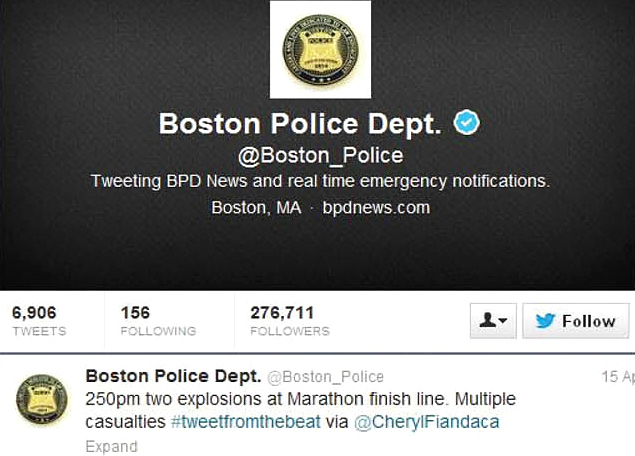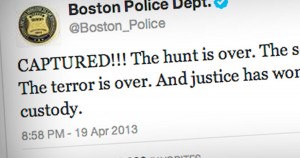How Social Media Shaped the Boston Bombing Investigation

Monday 15th of April 2013, terror struck one of the largest cites on the American east coast, Boston. The terror came in the form of two bombs which exploded with a twelve second interlude. The bombs were situated near to the finish of the cities marathon. As rescuers rushed to help injured victims, the media vultures swooped vying for the best footage to document the event. But who was the first person to report the news to the world? It is increasingly believed the first account came from a Twitter user in the form of a tweet, which read: “holy %$@#, explosion”. Here we explore how social media shaped the Boston Bombing investigation.
Shifting News Media
Increasingly over the last year, Twitter is displacing traditional methods of media coverage. Twitter users are not bound to any ethics or convention, which frequently bind journalists. Often tweeters are neither reliable nor accurate, but they are first off the touch line. In the increasingly short attention span driven world in which we live, people turned to the hashtag #bostonbombing, before traditional news sources such as CNN or Fox News. Due to this new-stations increasingly raced to beat internet sources to report news, this lead to several embarrassing erroneous reports:
- The New York Post falsely reported a Saudi national in custody associated to the bombings.
- NPR falsely reported an accessory to the bombing was arrested and taken to jail naked.
- In the minutes following the second bombing, New Networks erroneously reported a third bomb exploding at the JFK Library.
- The New York Post embarrassingly falsely named a high school student as a suspect. Following which both his name and an image were streamed over various news channels, the teenager went in person to the police station in order to clear his name.
The Impact of Social Media on the Abilities of the Police
Social Media had a dramatic impact on the ability of the FBI, police force and associated law agencies, to conduct their duty. During the city lockdown, over 80,000 people turned into police radio frequencies via smart phones, the internet and other radio listening devices. Although this is not a new phenomenon, the difference here was the trending associated hashtag: #BostonPoliceScanner.
 This hashtag highlights one of the primary reasons individuals are increasingly turning to Twitter first for news updates. Hundreds of those listening to the Boston Police Scanner, were then tweeting what they heard directly onto the platform. The extent of the tweeting resulted in the Boston Police Department sending out a tweet asking members of the public not to give away their tactical positions.
This hashtag highlights one of the primary reasons individuals are increasingly turning to Twitter first for news updates. Hundreds of those listening to the Boston Police Scanner, were then tweeting what they heard directly onto the platform. The extent of the tweeting resulted in the Boston Police Department sending out a tweet asking members of the public not to give away their tactical positions.
Subsequently after the tweet, the internet feed to the Boston Police Scanner died. Despite this many found other routes to listen to the police radio, at one point over 2.3 million were reported to be listening.
Bogus Twitter Accounts made Claiming to be Suspects
Some would argue that freedom can be dangerous in the wrong hands, this final effect that social media had upon the investigation seems to prove this point. Unfortunately for the police some dubious individuals took it upon themselves to create a Twitter account pretending to be the police suspect. The account was disruptive to the police enquiry, feeding death threats directly to the Boston Police Force.
The tweets were tweeted directly at the account of the Boston Police Department, and needless to say caught their attention. The account was announced via the police radio causing them to delay their tactical plans and in all likelihood delayed the capture of the true suspects. The account was quickly discredited as it had only existed for an hour.
